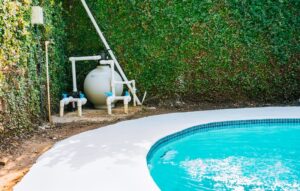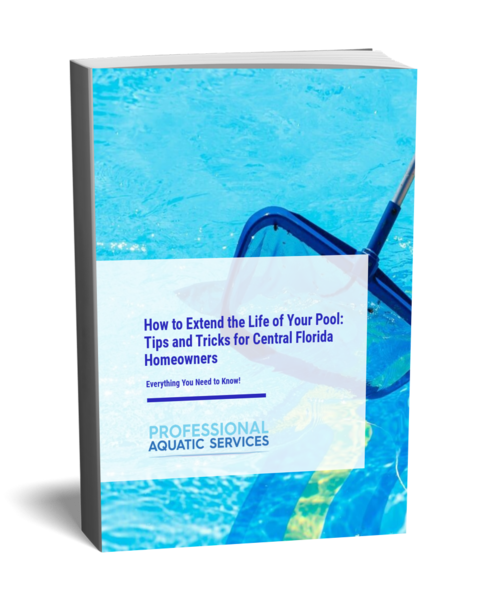Discovering your pool pump not working is frustrating and can quickly turn your backyard oasis into an eyesore. Without proper circulation, pool water becomes cloudy in just a few days, creating the perfect environment for algae growth and bacteria buildup—making your pool unsafe and uninviting for your family.
But don’t worry; keeping your pool clean and safe until the pump is fixed doesn’t have to be complicated. You’ll learn practical, simple ways to maintain clear, healthy water even without a functioning pump, helping you avoid bigger headaches down the line.
Plus, you’ll discover when it’s time to call in pool professionals. With expert help, you’ll quickly restore your pool’s clarity, safety, and enjoyment, ensuring your downtime is brief, and your family can get back to relaxing sooner.
Table of Contents
TogglePool Pump not Working? The Signs You Should Know

Before jumping into solutions, double-check if your pool pump is not working correctly. You can usually spot trouble easily, even without technical training. Watch for these common signs:
- Water isn’t circulating effectively. If you notice debris staying put, it’s a clue your pump motor might be blocked or jammed. This often leads to dirty water buildup and algae growth.
- Your pool looks cloudy or stagnant. When your filtration system fails, chlorine alone won’t clear cloudy water. It indicates your pump basket, impeller, or suction line might have issues.
- Strange noises or the pump won’t start. If you hear humming, grinding, or loud rattling, the motor could have bad bearings, faulty o-rings, corrosion, or a loose pump lid.
Spotting these signs early saves money by preventing bigger pool equipment problems later.
Can You Keep Your Pool Clean Without a Pump?
When your pool pump is not working, it’s natural to worry about keeping your pool clean. Without proper water flow, dirt settles quickly, and algae can take over, especially under the hot sun. You might even notice your water turning cloudy or stagnant in just a couple of days.
It’s definitely tricky to maintain a clean pool without your pool pump motor doing its job—but not impossible. Temporary solutions, such as brushing the pool surfaces regularly and carefully balancing the chemicals, help keep the water clear until your new pool pump is installed. These quick fixes matter because they prevent minor issues from becoming major headaches.
Just remember, temporary measures aren’t a replacement for a working pump. The sooner you address the problem professionally, the faster you’ll return to carefree pool days.
Practical Tips to Keep Your Pool Clean When the Pump is Out
If your pool pump is not working, you may worry about losing control over your water quality quickly. But even without a functioning pump, you can keep your pool clear and safe temporarily by following some practical steps. These tips won’t fix common pool pump problems like leaks or power issues, but they’ll help you manage cleanliness until repairs happen:
- Skim debris daily: Use a net to regularly remove leaves, insects, and other floating debris to prevent buildup.
- Adjust chemicals carefully: Without proper circulation, water becomes stagnant quickly, thereby increasing the risk of bacteria. Carefully test and adjust chlorine levels slightly higher to fight contaminants.
- Cover your pool: A cover keeps dirt, dust, and debris from entering the water, especially helpful for a small backyard pool where contamination is more noticeable.
- Brush pool surfaces: Algae easily form without proper circulation, so brush the sides and bottom regularly to loosen buildup.
Common Mistakes to Avoid
While temporary solutions can help, it’s easy to make mistakes when your pool pump is not functioning properly. Avoid these common errors to maintain water safety and clarity until your pump is repaired:
- Overusing pool chemicals: Adding excessive amounts of chlorine or other chemicals can damage your pool’s seals and cause skin irritation.
- Ignoring water testing: Without a working pump, it’s critical to check your pool’s chemical balance often. Regular testing helps determine when adjustments are necessary.
- Allowing debris to build up: Leaving dirt and debris in your pool will rapidly degrade water quality, increasing maintenance demands later on.
- Incorrect cleaning methods: Using high-pressure equipment or harsh cleaning agents may damage your pool’s filters or surfaces, leading to expensive repairs.
Following these guidelines helps keep your pool clean and ready until your pump is professionally serviced or replaced.
Restore Your Pool’s Health—Schedule Expert Service
When your pool pump is not working, quick action is essential. Delaying repairs allows stagnant water to harm your pool, creating algae issues and costly maintenance later. Checking your pressure gauge won’t fix deeper pump troubles—this needs professional skill.
Professional Aquatic Services provides you with peace of mind by accurately diagnosing and promptly resolving your pool issues. Expert technicians restore your pool’s circulation and clarity. You’ll benefit from their reliable advice, ensuring your pool remains healthy in the long term.
Don’t risk bigger expenses and downtime by waiting too long. Schedule professional service promptly to get back to enjoying crystal-clear water.
Frequently Asked Questions
If your pool pump stops working, immediately remove debris manually, test and carefully balance chemicals, brush surfaces to prevent algae, and consider covering your pool temporarily.
A pool can remain clean for a short period (a few days) without a pump if you regularly skim debris, balance chemicals, and brush pool surfaces.
Swimming in a pool without a working pump isn't ideal. Without proper circulation, bacteria and algae grow quickly, potentially causing skin irritation or health issues.
You may slightly increase chlorine levels to prevent algae growth, but avoid excessive chemical use since water isn't circulating effectively. Test frequently to maintain balance.
Your pool pump likely needs professional repair if you notice poor water circulation, unusual noises, cloudy water, or if it doesn't start despite proper connections and power.
Ignoring a broken pool pump leads to stagnant, cloudy water, rapid algae growth, and possibly costly damage to other pool equipment. Quick professional servicing prevents these issues.

